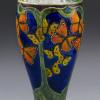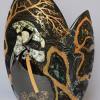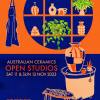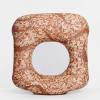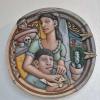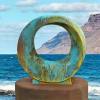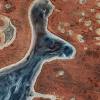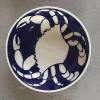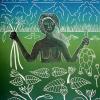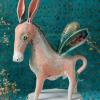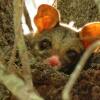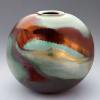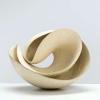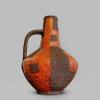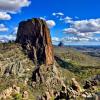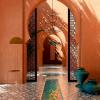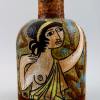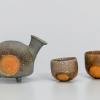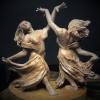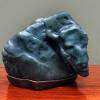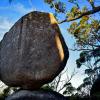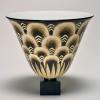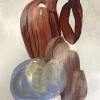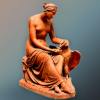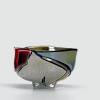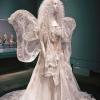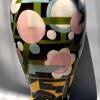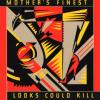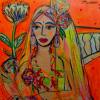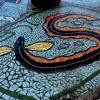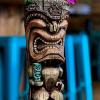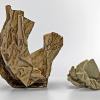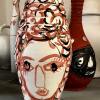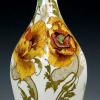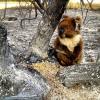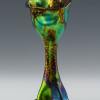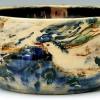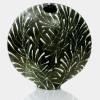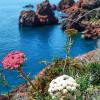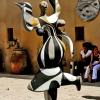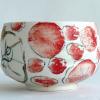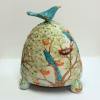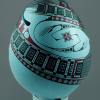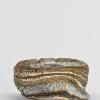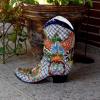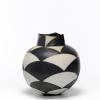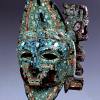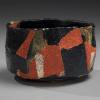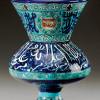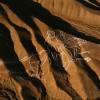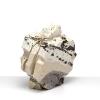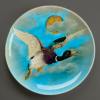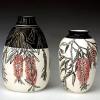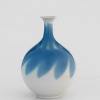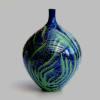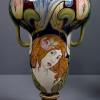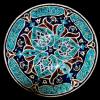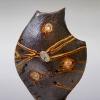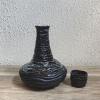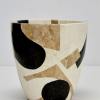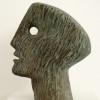Garden sculptures of heightened spirit Downunder
All of the three following gardens are located on the outer Eastern fringe of Melbourne, Victoria. Each garden is approximately one hour travel time from the centre of Melbourne with an additional 45 minutes of travel between them.
Australia Garden :
Cranbourne, Victoria

Queensland Bottle Trees in a rock landscape
Contemporary Australia Garden, Cranbourne, Melbourne
The bold, sweeping contemporary botanical gardens at Cranbourne were created from a former sand quarry. It was designed to allow visitors to follow a metaphorical journey of the movement of water through the Australian landscape, from the desert to the coastal fringe. Via innovative artistry of landscape design, this integrated landscape brings together horticulture, architecture, ecology, and art to create the largest botanic garden devoted to Australian flora.
The first half of the Royal Botanic Gardens at Cranbourne was completed in 2006 and Stage 2 was completed in Spring 2012. The stylized native landscape gardens showcase the diversity of environments found on the Australian continent along with much of the exotic and wonderful flora which may be found there.

Grevillia flowers — Australia Gardens, Cranbourne
Spread out over 15 hectares and inspired by Aboriginal art forms, the highly landscaped gardens use colour selections of clusters of native plants to sculpt shapes onto the landscape. Lots of open spaces are given consideration between the designed elements to replicate the vast open expanses of the Australian landscape.
Also known as the ‘Australia Garden’, it presents sequences of original sculptural and artistic landscape experiences modelled into precincts such as the Gondwana Garden, Red Sand Garden, Ephemeral Lake, Serpentine Walk, Vine Garden and Eucalyptus walk. Included in the gardens are a rich variety of native plants which include the Albany Daisy, Kangaroo-paw, Pincushions, Pineapple Bush, Rope-rush, Popflower, Snakebush, Mat-rush, Grass tree and other fascinating rockery plants.
The unique Australia Garden is designed to be a companion piece to the Melbourne Royal Botanical Gardens and is in contrast to its European botanical features. The layout utilizes 170,000 plants across 1700 species all adapted to this challenging site condition, with species selected not only for their suitability to low organic media, but also their adaptation to low water utilization and drought tolerance.
The young gardens are still evolving and has free entry and can be witnessed from the elevated Boon Wurrung Cafe. Visiting these gardens is a journey that becomes a choreography of movement balancing abstraction, metaphor and landscape poetry through the combination of ancient native plants, rocks and water with space.
Rock garden – Australia Garden
‘Melaleuca Spits Lake’

Blue Wren – Australia Gardens
Rock garden built with Castlemaine stones
‘Lily Pad Bridge’ – Australia Garden, Cranbourne, Victoria
Cranbourne Botanic Gardens—Castlemaine rocks
‘Ephemeral Lake’ at Cranbourne Australia Garden
Sculptor Mark Stoner in collaboration with Edwina Kearney
Highlighted by white ceramic elements, the work is predicated on the idea of the presence and absence of water and the horizontal nature of its dispersal across the arid zones of Australia. Viewed as a meandering rather than a direct flow pattern. This requires a certain way of movement, a linear sensibility. This allows a rhythm and tempo in the work, a quietness, a distillation of time and space. Ephemeral Lake introduces the narrative of water in this ancient, degraded, arid and flat continent.
‘Red Sand Garden’
Red Sand stylized garden
Australia Garden – aerial perspective
Maybe because the aerial configuration of the gardens look like an abstract painting, to me the gardens felt like a living, breathing sculpture. Traversing the gardens was a grounded, immersive experience that felt vibrant and refreshing. As you enter the gardens, the first thing you witness is the huge, minimalist Red Sand Garden, an immediate statement of scale and conceptual intent for a botanical garden you haven’t seen the likes of before.
Flower Spikes on Johnson’s Grass Trees
Australia Garden, Cranbourne, Victoria
Red Bush Ranger (Anigozanthos) – Australian native flower
Contemporary landscape gardens, Cranbourne
photo by Craig-Ward
Flowering red gum nuts
Cranbourne Botanical Gardens – photo by Roger Nelly
Native plants in a contemporary setting at the Royal Botanical Gardens, Cranbourne
Sightseeing buggies at Australia Garden
RBCG – Royal Botanical Cranbourne Gardens
Australia Garden water course sculptures
Melaleuca Spits – Sculptured lakes – Australia Garden, Cranbourne, Victoria
Queensland Bottle Tree – Australia Garden, Cranbourne
William Ricketts Sanctuary :
Olinda, Mount Dandenong
William Ricketts Sanctuary is nestled in the Dandenong Mountains in a lush fern forest, in a natural setting of beauty and tranquility. It is an ideal location for Ricketts mystical sculptures, which merge naturally with the ferns, along enchanting pathways. William Ricketts, an Australian potter and sculptor, began creating his sculptural odyssey in 1934, making his visionary pieces from clay and kiln firing them before attaching them onto the natural rock formations.
Having spent 2 years in India at the Sri Aurobindo spiritual center in Pondicherry, and making frequent trips into Central Australia to live with Pitjantjatjara and Arrernte Aboriginal people from 1949 to 1960, his works express a spiritual resonance reflecting his empathy with Indian and Aboriginal spirituality and philosophies. His sculptures were inspired by the cultures and ancient traditions of the Indigenous Australians and their bond with the earth. Torsos of men, women and children covered in moss protrude from tree trunks and boulders. Winged sculptures reach heavenward and others embrace protectively, reinforcing their family bonding. His kinship with the Aboriginal peoples and love of the Australian landscape has translated into a collection of over 100 forest sculptures, which amount to a life long mission, to promote and immortalize the deep spirit of the ancient Australian cultures.

Indigenous Elder waterfall sculpture at Rickett’s Sanctuary
Winged Aboriginal boy sculpture
William Ricketts self portrait sculpture with totem Lyrebird tail feathers
Entrance sculptures to William Ricketts Sanctuary
Ricketts Sanctuary entrance rock sculpture
William Ricketts sculpture of an Aboriginal elder
Rock wall sculptures under native ferns
A William Rickett’s ‘Earth Mother’ sculpture
Three Aboriginal angels sculpture
Photo by Jakwak

Unique sculpture garden of rock and moss
William Ricketts – (1898-1993)
Photo by Ern Mainka
Mountain fern forest Aboriginal sculpture
Ricketts Sanctuary
Stone sculpture with concentric circle motif
Inscribed on the Sculpture :
Beyond organized religions, Beyond man’s institutions
Is the true state of being
Essence
That Thou Art – Tat Twam Asi
William Ricketts sculpture of aboriginal children
Terracotta sculpture by William Ricketts
Carter’s Price Guides to Antiques and Collectables
William Ricketts earthenware plaque modelled with an indigenous Australian motif
Unglazed earthenware sculpture – William Ricketts
Ricketts Sanctuary
Olinda, Mount Dandenong
Moss covered, bearded Aboriginal elder sculpture
Wall relief and inner sanctum – William Ricketts
Google Earth photo – Indriati Naland
Earth Mother by William Ricketts
Sculpture of an aboriginal seated on a rock ledge with hands reaching up from the earth.
Rock sculpture immersed in the fern forest
Bruno’s Art and Sculpture Garden :
Marysville, Victoria
Bruno Torfs grew up in South America and moved to Australia as an adult. One of the first places he visited was the mountainous Marysville, which he interpreted as a kind of Middle Earth location due to its natural splendor, mystique and beauty and he immediately felt an affinity with the rugged and graceful landscape. After acquiring an established art gallery there he began creating his sculpture garden full of artworks of Celtic, European and Russian influence along with Australian aboriginal art. Assisted by his wife Maureen, he expanded his garden over several years to include over 200 sculptures and paintings. The lush rainforest embraced his sculptures like they always belonged there, even after they were confronted with the misfortune of a dreadful bushfire in 2009 that destroyed most of the town including his home and some of his artworks.
As a professional artist he believed that the universe supports you when you follow your passion so he continued. He also viewed the event as a cleansing and rebirth for himself and the environment and entered a new phase for his fantasy garden project. His clay sculptures are quite often constructed outdoors and kiln fired on-site. Through his diverse talents and a spirit for adventure, Bruno has kept creating his unique sculptures full of culture and character and his wonderful garden is on the way to a full recovery.
Girl Riding a Unicorn sculpture – Bruno Torfs Garden

Bruno Toff in his garden at Marysville
Queen Bee sculpture
Bruno Torfs Garden sculptures
Seated Goddess on her throne in a fern canopy
After surviving the Black Saturday bushfire. A close call, some of the sculptures were crushed by falling trees.

Terracotta statues intact after the raging furnace
Sculpture of a man and a boy in a fire ravaged landscape, curiously in synch with the environment
Another surviving sculpture in synch with the event.
A sculpture of an embracing couple in a razed forest
Scorched tree carved sculptures at Bruno’s garden
Large hand sculpture water fountain – Bruno Torfs

Bruno Torfs holding a painting that avoided destruction
Forest Flutist sculpture
Robed female sculptures – Bruno’s Garden
Bush forest gumtree elemental sculpture
Coiled snake woman sculpture
Sculpture on a bed of moss – Bruno’s art and sculpture garden
Bearded mystic sculpture
Bush meditation sculpture against a gum-tree trunk
Sculpture of girl with forest wombat
Sculpture of a boy in the forest with owls
Forest minstrel on a tree stump sculpture
Mermaid sculpture in a mountain stream
Talking to a crow – Bruno’s Garden
Sculpture of an Australian Aboriginal with Didgeridoo
The forests of the above 2 gardens are home to the remarkable Lyrebird, capable of a diverse range of bird calls and mimicry


































































